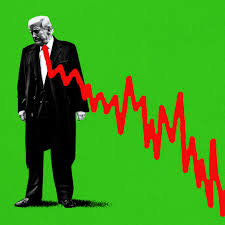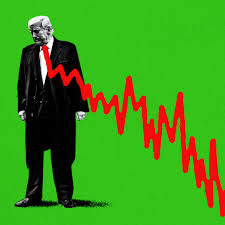News Analysis: The Coming Trump Tariff Recession
An economist explains how and why triggering a foolish global trade war will weaken the U.S. economy, national security, and our standing in the world
By Lanny Ebenstein
How bad will it get economically in the coming months?
Economic forecasts are always difficult because there are so many variables in play and so many currently unknown factors that will be of influence. Nonetheless, it is clear that the United States appears to be headed toward a significant recession, and one individual will be preeminently to blame: Donald Trump.
Perhaps the worst aspect of the tariff policy introduced in recent weeks is the sheer fatuousness of it.
First tariffs of one amount are announced, and then they are revised within days. In the case of China, when President Trump responded with a tariff increase of 50 percent after the Chinese retaliated for his tariff of 34 percent with a 34 percent tariff of their own, he demonstrated himself to be not merely a tragically wrong economic analyst but a flake of the highest order.
Whatever happens during the 90-day "pause" in tariff increases announced by Trump (other than on China), great damage has been done to the United States's reputation for economic reliability, stability, safety, and leadership.
As a scholar of economic history, I am a great admirer of the basic economic course in trade followed by the United States since the end of World War II--under both Republican and Democratic presidents--in promoting freer international trade and more open global markets.
Free markets lead everyone to be better off, and, as an added significant bonus, they tend to promote peaceful relations among nations. War is less likely when there is extensive economic interaction among countries.
The tariffs announced by President Trump will do real harm to the United States economy.
Prices of many goods will increase. Supply chains will be disrupted. Unemployment will rise. The value of the dollar will continue to decline in value (already down about 8 percent since the beginning of the year). Interest rates will increase. The stock market will continue to fall. It is no wonder consumer confidence--a source as well as a consequence of economic activity--is plummeting at a virtually unprecedented rate.
Perhaps worst, many foreign countries and foreign investors are losing interest in the United States as a possible business partner, place of investment, destination for exports, or source of imports.
To be as clear as can be: as long as Donald Trump is president of the United States, much of the rest of the world--including historical allies--will shun the United States because of his sheer unpredictability and petulance.
It is a problem economically when the leader of a nation regularly acts like a preschooler having a tantrum. Quite apart from his policies, President Trump's persona will be an impediment to national economic growth in the remainder of his time in office.
But it could well get worse.
The U.S. dollar has, since the end of World War II, functioned as the world's reserve currency. This may change. If China, in particular, decides it no longer is in its interest to save dollars and invest in United States treasuries, the value of the dollar will fall and interest rates will rise.
The Federal Reserve would probably respond with quantitative easing (i.e., printing money) and higher inflation would result. It's difficult, further, to lower interest rates with higher inflation.
To continue this pessimistic scenario, another source of U.S. international dominance has been that oil prices are denominated in dollars. If this were also to change, in part as a result of inflation, the American economic era could be over.
Under any circumstances, the U.S. federal budget deficit is already out of control.
Budget deficits of $2 trillion-plus per year are probably in store for as far as the eye can see. If there is a recession in the coming year, the federal budget deficit will top $3 trillion. Governments at all levels will be affected as expenditures rise and revenues decrease in a deteriorating economy.
In sum and short: Donald Trump's second administration will probably be a disaster for the United States economically. His policies are more likely to make America last than first, and to ruin America economically than to make it great again.
Lanny Ebenstein teaches economic history and the history of economic thought at UCSB.
Image: Photo illustration by The Atlantic.



